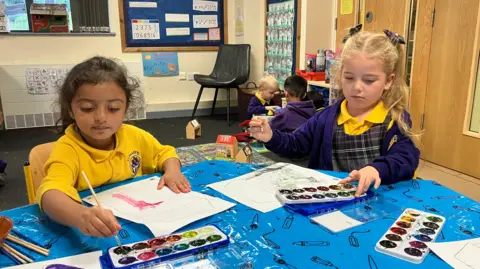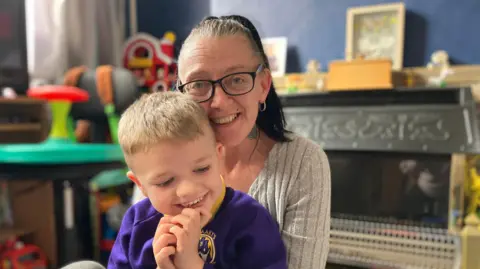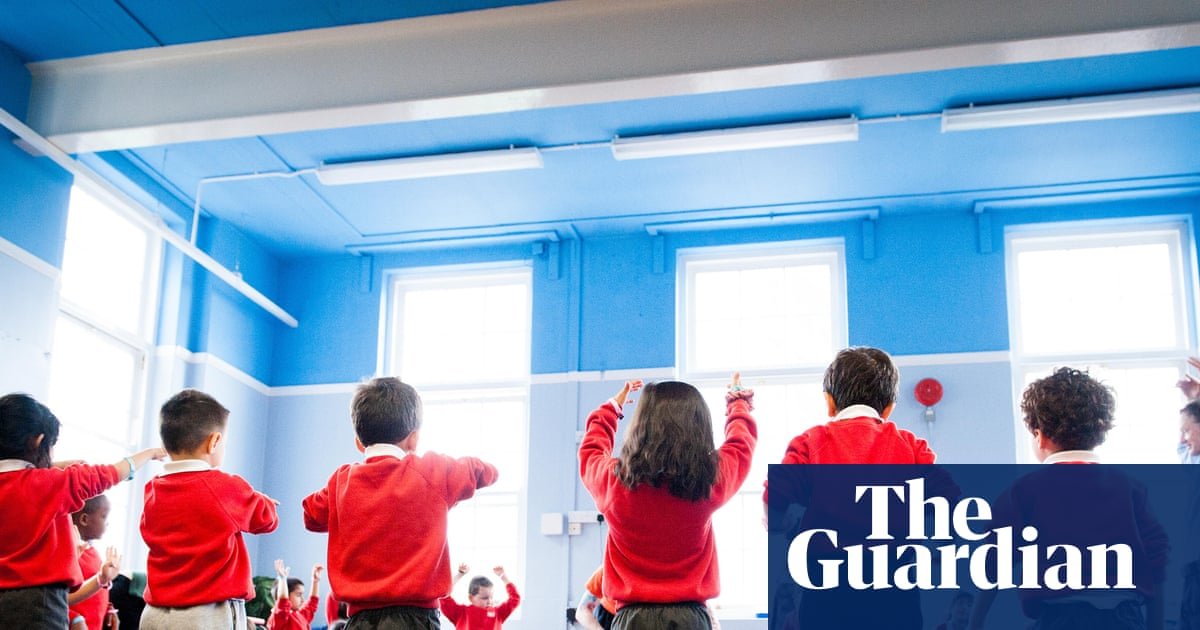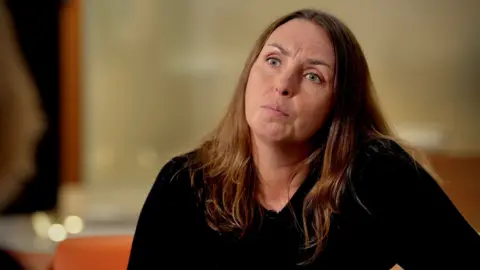Education
More school-starters missing key skills like toilet training, teachers say

Kate McGoughEducation reporter, BBC News
 Getty Images
Getty ImagesSchools are “picking up the pieces” as more children start reception without key skills such as speaking in full sentences or using the toilet independently, teaching unions have told the BBC.
A third of teachers have at least five children in their school’s reception class who need help with going to the toilet, a survey of more than 1,000 primary school teachers in England suggests.
Nine in 10 who responded to the Teacher Tapp survey had seen a decrease in speech and language abilities among new starters over the past two years.
The government previously announced a target for 75% of children to be at a good level of development on leaving reception by 2028.
At St Mary’s Church of England Primary School in Stoke, speech and language therapist Liz Parkes is helping reception pupil Gracie sound out words that rhyme.
Liz comes to the school once a week to do one-to-one interventions like this, and to offer training and support to teachers on how to spot issues.
Around a quarter of pupils at St Mary’s need some extra support with speech and language when they join reception, but with Liz’s help that number is down to just a handful of pupils by Year 2.
Liz says social isolation is partly the reason for the decrease in communication skills.
“Children are increasingly spending a lot of time looking at a screen and not necessarily engaged in more meaningful interactions or developing the kind of listening skills you need when you hit nursery and reception.
“We’re seeing children in reception who haven’t experienced having conversations on a regular basis or aren’t having a range of experiences where they’re exposed to language.”
 BBC/Kate McGough
BBC/Kate McGoughTeacher Tapp, a survey tool, asked primary school teachers in England about school readiness a week into term. In results seen exclusively by BBC News, they found:
- 85% of 1,132 respondents said they had at least one reception pupil who needed help going to the toilet
- 33% have at least five children needing help, while 8% had at least 10
- 92% reported a decrease in speech and language abilities among reception starters over the past two years.
A Department for Education spokesperson said that the government was working to ensure that a record share of children are “school-ready” at the age of five, “turning the tide on inherited challenges of lack of access to high-quality early education, and helping teachers focus on teaching so every child in the class can achieve and thrive”.
The spokesperson added that the government had already increased access to early years care for hundreds of thousands of families and was investing £1.5bn to “rebuild early years services”.
 BBC/Kate McGough
BBC/Kate McGoughCatherine Miah, deputy head at St Mary’s Church of England Primary School in Stoke, encouraged schools to budget for a speech and language therapist, who could have an “incredible” impact on children.
“We’ve had to make sacrifices elsewhere, but if children aren’t ready to learn you could sit them in front of the best phonics lessons in the world, they’re not going to take it onboard if they’ve not got those learning behaviours.”
The school says a third of its pupils need help with toilet training when they join nursery, but the school works with parents to ensure they are toilet-trained by the time they reach reception.
“We’re a team. It’s not a case of saying to parents ‘This is your job. Why haven’t you done it?’ We need to work together.”
The government has set a target that 75% of children leaving reception at five years old will have a “good level of development” by 2028. Last year 68% of children were at that level, so an extra 45,000 children a year are needed to reach that goal.
To achieve a “good” level of development, a child is assessed by teachers at the end of their reception year on tasks including dressing, going to the toilet, and paying attention in class.
Pepe Di’Iasio, of the Association of School and College Leaders, said reception teachers were “brilliant” at supporting young children but local services have been badly eroded over the past decade.
“It has left schools picking up the pieces,” he said. “Many children are starting school already several months behind their peers.”
Parenting charity Kindred Squared found that teachers are spending 2.5 hours a day helping children who haven’t hit developmental milestones instead of teaching.
They have written a set of guidelines for parents to check whether their child has the skills they need to begin school.
The Department for Education was approached for comment.
 BBC/Kate McGough
BBC/Kate McGoughDiane’s son has just started Year 1 at St Mary’s in Stoke this year. She says without the school’s support he would have been much further behind in his development.
“Within two weeks he was out of nappies,” said Diane. “They would help him on the toilet here and I’d do it at home, we’d work together.”
Teachers say her boy is thriving, but Diane says the school has been instrumental in supporting his special educational needs and improving his speech and language.
“He does a lot for himself, whereas before he was always dependent on me. School have helped me to help him become more independent and more confident,” she said.
Additional reporting by Emily Doughty
Education
SDOC talks AI in schools – upstatetoday.com

SDOC talks AI in schools upstatetoday.com
Source link
Education
Special needs overhaul risks becoming ‘welfare reforms mark 2’, IFS finds | Special educational needs

Special needs reforms for children in England could turn into “welfare reforms mark 2” unless the government can convince parents that it is not aiming to save money, according to a report by the Institute for Fiscal Studies.
The thinktank said any changes to the current system of education, health and care plans (EHCPs), which mandate tailored support for children with special needs, will be highly controversial among parents, but said reform was “long overdue” as the number of EHCPs issued has ballooned by 80% since 2018.
About one in 20 school-age children and young people in England currently have an EHCP.
Earlier this year the government was forced to U-turn on changes to disability and health-related benefits after a huge backbench MPs’ rebellion, and the Institute for Fiscal Studies (IFS) suggests that botching reforms to special educational needs and disability (Send) provision could provoke a similar backlash.
In a briefing entitled England’s Send Crisis, the IFS said: “Any reforms are likely to generate controversy. If the focus is on reducing legal rights to cut short-term costs, this could easily turn into welfare reforms mark 2.
“To avoid this, the government needs to be candid: the current system is failing many of the children it is meant to support, despite billions in additional spending and a complex framework of legal entitlements.
“A successful reform should articulate a clear vision for a system that supports all children while delivering better value for money.”
Luke Sibieta, the co-author of the briefing, said the success of any reforms hinged on the government’s presentation of the white paper it is preparing to publish later this year.
“If the focus of what’s in the white paper, and how it is sold, is all about saving money and reducing burdens, then it’s very hard to see how this policy will go through.
“But if it is about providing a better quality of service, or providing access to support earlier, in an easier and better way, then I can see how the policy can be successful,” Sibieta said. “When you talk to parents, no one actually likes the EHCP process.”
Bridget Phillipson, the education secretary, also faces a struggle to convince the Treasury that more spending is needed, especially to build more dedicated special schools, as well as dedicated Send units within mainstream schools.
The IFS said creating more state-funded special schools was an “obvious solution” that would allow local authorities to avoid using more expensive private special schools, where the average cost for each pupil is £62,000 a year compared with £24,000 in the state sector.
The number of pupils with EHCPs at private special schools has tripled since 2016, from 10,000 to 30,000, with that increase alone accounting for nearly £1bn of the £4bn annual rise in high-needs spending over recent years.
The IFS was also highly critical of EHCPs, legal documents in which local authorities and parents agree on the additional support for children with special needs.
“EHCPs are meant to guarantee help. However, you cannot magic quality into existence by writing it on a legal document,” the report notes.
“As a result, the quality of current provision is patchy. Many children are pulled out of lessons for support from poorly trained teaching assistants, missing time with qualified teachers. We have almost no way of judging whether the billions in extra funding represent value for money.”
A Department for Education spokesperson said: “This government inherited a Send system left on its knees – which is why we are listening closely to parents as we work to improve experiences and outcomes for all children with Send, wherever they are in the country. Our starting point will always be improving support for children.”
Education
Cost of children’s homes doubles but care can be poor

Alison HoltSocial affairs editor and
James Melley and Judith Burns
 BBC
BBCThe cost of residential care for vulnerable children in England has nearly doubled in five years but many children still do not receive appropriate care, says a report from the independent public spending watchdog.
The National Audit Office (NAO) says councils on average spent £318,400 on each child placed in a children’s home in the year ending March 2024.
But these huge sums do not represent value for money, the report concludes.
“I do not know where the money is being spent,” says Ezra Quinton, now 20, who recalls smashed windows and broken glass in the showers of one of the care homes he was placed in.
Ezra, who now works for Become, a care leavers’ charity, first went into care aged nine.
Originally from Greater Manchester, he remembers being moved to a different home every few months, often many miles from where he originally lived.
He thinks he had up to 60 different placements and although he has spent most of his life in Salford and Stockport, he has lived in Wales, Liverpool, Crewe and Leeds.
His education was considerably disrupted but he did achieve C grades in all of his GCSEs.
At one home the windows were boarded up because of smashed windows.
“We were told to wear shoes if we wanted to shower because they didn’t clean up the glass properly,” he told BBC News.

The NAO report found rising costs were driven by a record number of children in care, the increasing complexity of their needs – and a profit driven market.
In 2023-24 councils spent £3.1bn on residential placements, in a market the report describes as “dysfunctional”.
It says councils are struggling to find enough appropriate placements, arguing that this allows many private care providers to cherry pick the children they take, based on how much support they need and how much profit this allows.
The report draws on previous research which showed the 15 largest providers of children’s homes making average profits of more than 22%.
Report author Emma Wilson says several factors contribute to rising costs but with the overwhelming majority (84%) of children’s homes run for profit: “It’s really important to get right that balance between supply of available care home places and demand.”
She wants the Department for Education to do more to oversee a market which she says is failing children in residential care.
“The NAO report concludes that the system of residential care for looked after children is not delivering value for money. On the one hand, costs have doubled to over three billion in the last five years, whilst many children are not in appropriate settings,” Ms Wilson told BBC News.
The report highlights how in March 2024 two thirds of children in residential care were in homes outside their local authority and almost half (49%) were more than 20 miles from home.
The Department for Education said in a statement: “Vulnerable children across the country have long been let down by years of drift and neglect in children’s social care, which this report lays bare.”
It added that it was “driving the largest ever reform of children’s social care” to “break the cycle of crisis for children” – pointing to its planned recruitment of more family help workers and new legislation aimed at ending profiteering in care homes.

Claire Bracey, interim chief executive of Become, says the report “is once again lifting the lid on the extortionate profits that are being made from providing homes for our most vulnerable children”.
“This market failure is leading to the most unforgivable failure [for] the futures of the children in our care…
“Children in care can’t wait. Urgent steps must be taken now,” she argues.
But some small, privately run, children’s homes insist they don’t make excessive profits.
Sara Milner, who set up Cherry Wood children’s home in Surrey four years ago, after a career in local authority care, says staffing accounts for 80% of costs.
“The fees we charge the local authority are reflective of our direct costs and we make moderate margins… but obviously we have to be able to make profits to be a viable business and to offer security for the young people’s future which is obviously really important when you’re doing this type of work,” she told BBC News.
With demand for places high, she had also hoped to invest in a second children’s home, but says current pressures, including rising costs and difficulties recruiting staff, mean that has been delayed.

The government has already said it plans to limit the profits private companies can make, however the Children’s Homes Association, which represents providers paying tax in the UK, argues that council-run homes can in fact be more expensive.
“We know that official data shows that local authority costs are higher,” said the association’s chief executive Mark Kerr.
“So if there’s a value for money question then the independent sector arguably demonstrates more value for money than local authorities,” he added.
-

 Business2 weeks ago
Business2 weeks agoThe Guardian view on Trump and the Fed: independence is no substitute for accountability | Editorial
-
Tools & Platforms1 month ago
Building Trust in Military AI Starts with Opening the Black Box – War on the Rocks
-

 Ethics & Policy2 months ago
Ethics & Policy2 months agoSDAIA Supports Saudi Arabia’s Leadership in Shaping Global AI Ethics, Policy, and Research – وكالة الأنباء السعودية
-

 Events & Conferences4 months ago
Events & Conferences4 months agoJourney to 1000 models: Scaling Instagram’s recommendation system
-

 Jobs & Careers2 months ago
Jobs & Careers2 months agoMumbai-based Perplexity Alternative Has 60k+ Users Without Funding
-

 Podcasts & Talks2 months ago
Podcasts & Talks2 months agoHappy 4th of July! 🎆 Made with Veo 3 in Gemini
-

 Education2 months ago
Education2 months agoMacron says UK and France have duty to tackle illegal migration ‘with humanity, solidarity and firmness’ – UK politics live | Politics
-

 Education2 months ago
Education2 months agoVEX Robotics launches AI-powered classroom robotics system
-

 Funding & Business2 months ago
Funding & Business2 months agoKayak and Expedia race to build AI travel agents that turn social posts into itineraries
-

 Podcasts & Talks2 months ago
Podcasts & Talks2 months agoOpenAI 🤝 @teamganassi



